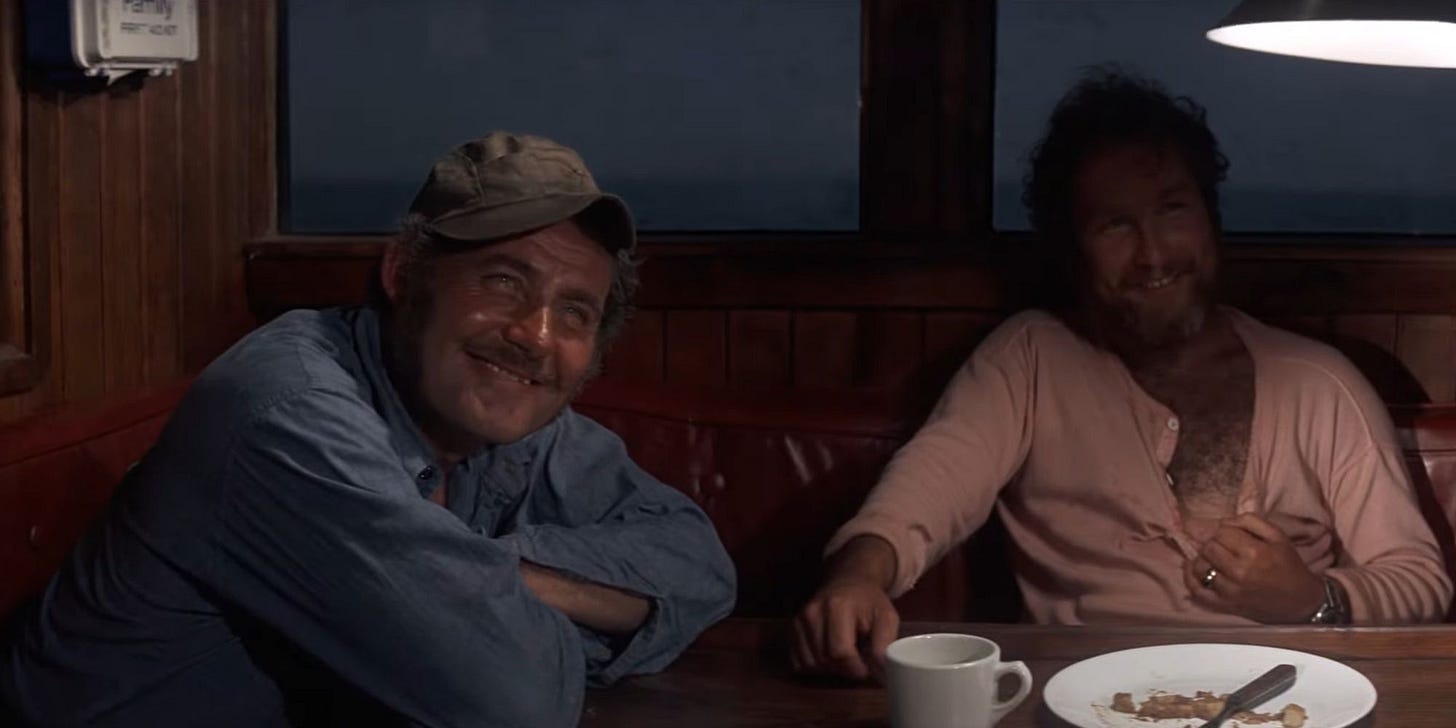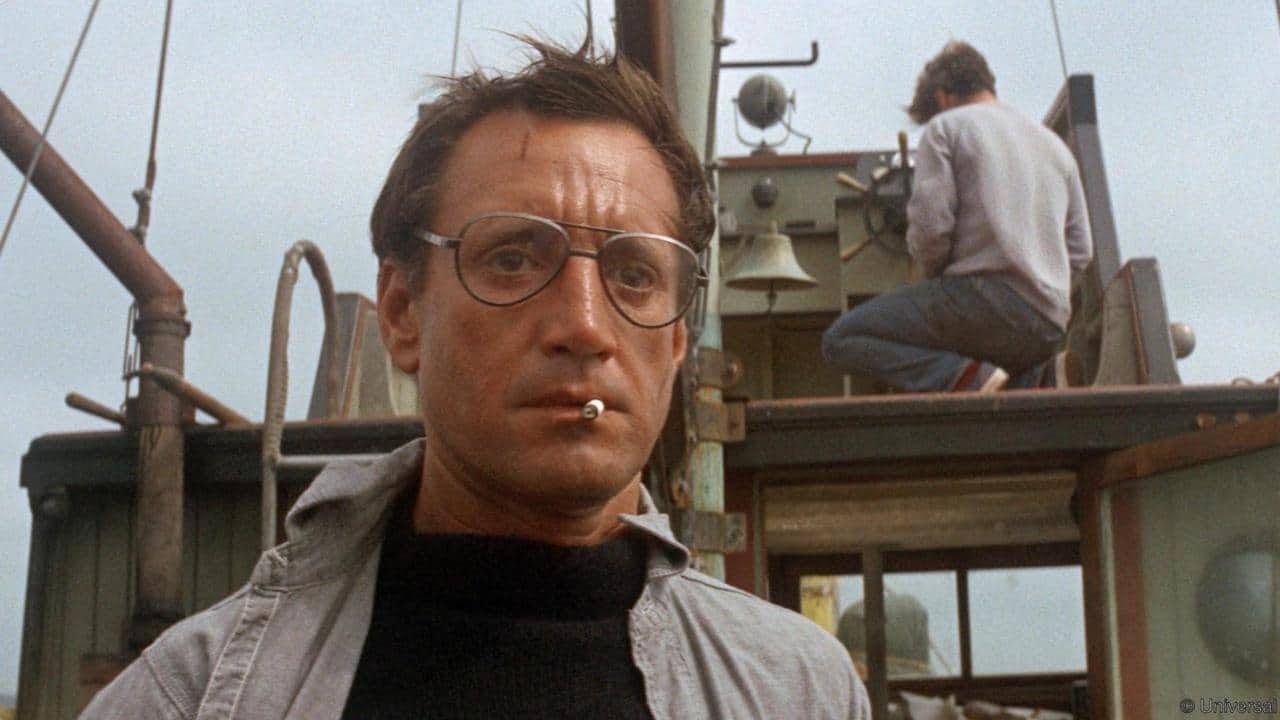Jaws: An Off-Balance Retrospective.
Summer dollars, Spanish ladies and bigger boats.
For a medium that prizes both nostalgia and present-moment momentum, though not always in totally equal terms, it bears acknowledging that the number of films that have shown the endurance required to actively maintain such a hold on the larger cultural psyche, it comprises a relatively short list.
So it is, with creative foundations always shifting, benchmarks, always moving and the exploration, rightfully, of new voices and thematic ideas, albeit, all backed by the kind of swaggering confidence only a fellow artistic soul could truly love.
But as Jaws, the Steven Spielberg-directed classic turns fifty this month, having first released in June of 1975, it can seem nigh impossible not to look back at the film (within the scope of those stated qualifiers) and feel, not overwhelmed per se, in the action of revisiting but impressed still, on just how strong its grip remains.
Neither wholly timeless nor totally removed from criticism but so essential, revolutionary even, to what its specific avenue of creation came to speak to: the film, with a visible, continuing impact, on so many fronts, perhaps just as enduring as its titular antagonist.
As Amity Island, a quiet New England tourism town, prepares for their summer season, they find themselves continually besieged by a relentless, man-eating, great white shark apparently driven to terrorize every inch of their beaches.
Determined then, to restore order despite initial resistance, police chief Brody (Roy Scheider) teams up with out-of-town marine biologist Hooper (Richard Dreyfuss) and grizzled shark hunter Quint (Robert Shaw), to not just lure their water-bound menace out but put it down permanently.
But as they set sail off the island’s coast, the trio quickly learn their adversary is no easy catch and as they find themselves facing increasingly dangerous odds with no way out, despite how they may clash personally, Brody realizes they must work together… or be dragged to the locker in pursuit.
And on the surface, fair enough, the back-of-the-bait box setup, as it were, it isn’t taking any exceptionally bold swings.
Yet the true success of Jaws, across the board, it lies in the delivery.
From the minute on the page to the execution surrounding it elsewhere.
Though adapting Peter Benchley’s same-named 1974 novel, the script, co-credited to Benchley and Carl Gottlieb, excises virtually all of the as-deemed superfluous subplots (instead placing the focus squarely on the hunt for the shark) but it is a narrative structured with finesse regardless.
Building, from the first act, into the second, into the third, as Amity goes from purposeful ignorance, into panic and then, the purposeful motion of stripping all those established supports away.
This, into something that resembles a slasher-stricken fishing trip gone terribly wrong, as the hunt, comprising the entire closing stanza of the film in totality, tightens every proverbial noose it can.
But it feels, not just necessary, given the established narrative stakes but earned too.
The dialogue, each line, deliberate, every performance, be it from the first half supporting cast (Lorraine Gary and Murray Hamilton) or the leads. For which each of Scheider, Dreyfuss and Shaw immediately establish, in both individualism amongst their characters (with relatively limited opportunities to do so, generally) but a collective purpose, as well, filtered through their contrasting dynamics (brought on, infamously, by a noted amount of real-world tension between Shaw and Dreyfuss).
There is Bill Butler’s cinematography. The strategic staging. Verna Fields’ still-panic inducing editing, the subtly of the art design, the overlay provided by John Williams’ forever-to-be iconic score.
Yes, Jaws is often held up, with “alright-alright-alright” pronouncement, as one of the greatest films ever made but beyond that veneer of such high praise, it is to understand just why it is granted that label in the first place.
Hardly anything feels misplaced or out of tune, the tight presentation, the pacing, every delegated joist of creative framework support.
Ironic, given what was endured just to get it there in the first place.
And that alone, that such an infamously troubled production, while integral to the Jaws story, could reasonably be punted into supporting addendum status, it really does highlight the strengths present, in defiance, in the final product.
Maybe it was the sheer logistical challenge of conducting live filming, on location, on the Atlantic Ocean or how production, as a result, lasted well over five months in the summer of 1974, a total of nearly 160 days.
Maybe it was the fact that the prop sharks built for the production (with a love-hate condor, nicknamed Bruce) were beset with mechanical drama, even with fourteen operators in their corner, robbing the film of its most visible hook (but paradoxically, forcing an undeniably successful reorientation around implied tension whenever possible instead). Maybe it was the constant rewriting required as a byproduct or a rapidly expanding budget, around ten million, that was exorbitant for the time.
Though maybe, through reading an excerpt from Laurent Bouzereau’s book, Spielberg: The First Ten Years (published online, as linked, by Vanity Fair in 2023), it is seeing the director approach the film with the sort of hindsight that comes only, long-on, well after the immediacy of even the post-mortem phase.
Recounting his distraught emotional standing on-set at the time, coupled with a professional insecurity that would seem impossible now, considering but lands when remembering that, indomitable as he is now, Jaws was only Spielberg’s, then 27, third proper feature.
I remember on the sixtieth day of shooting, crew members came to me asking, “When are we going to be done with this movie?” And I would honestly say, “I don’t know. We could finish it if I get fired, if I’m dragged off the movie and replaced by someone who could complete it quickly. Or maybe they’ll shut us down.” Whenever I talked about the possibility of me being fired or the show being shut down, most of the crew was happy about it—this wasn’t a labor of love for anybody. This was a physically impossible chore and people wanted to go home.
I never left the island because I knew that, if I did, I would never come back. Yet I never wanted to quit. Ever.
Jaws was a fun movie to watch but not a fun movie to make. It was made under the worst of conditions. People versus the eternal sea. The sea won the battle - but where we won was with audiences in every country.
And yet, so polished, so precise, so properly expressive, it arrives with a force that isn’t, not once, easily forgotten.
Beyond reproach? Of course not.
For as important as it is, from both a character and larger storytelling perspective, the pacing in the first half of the film can come across as silted and a touch too procedural at times. Occasionally striking up against the dividing line of exposition-engagement, without much in the way of reprieve until it laboriously pushes forward, though with a stricter character focus in response.
And fair or not, given the nature of its source material, though not the first or last, Jaws is very much a “guy’s film”, with little to be said for the contrary.
Though possibly the strongest praise is within the influence it cultivated. To strength - Spielberg’s own Jurassic Park, most notably, eighteen years later - and otherwise, specifically within the litter of franchise-capitalization Jaws sequels, to continued decrement, that were made over the following twelve years.
Today, perhaps best remembered for Michael Caine’s indifference towards them than anything positive relating to their actual creative aptitude.
Jaws can’t, shouldn’t, exist in something of a vacuum by virtue of its pedigree (and if anyone has proven that, it is Dreyfuss, whose bigoted, misogynistic comments at a screening of the film last year served as yet another reminder that pedestal placement is, more often than not, a fool’s errand) and reasonable arguments could be made, that other projects have surpassed on what it brought forward.
Though without Jaws, the counter could very well go, such an argument wouldn’t have the weight to be held in the first place.
Chomping down, fifty years on.







